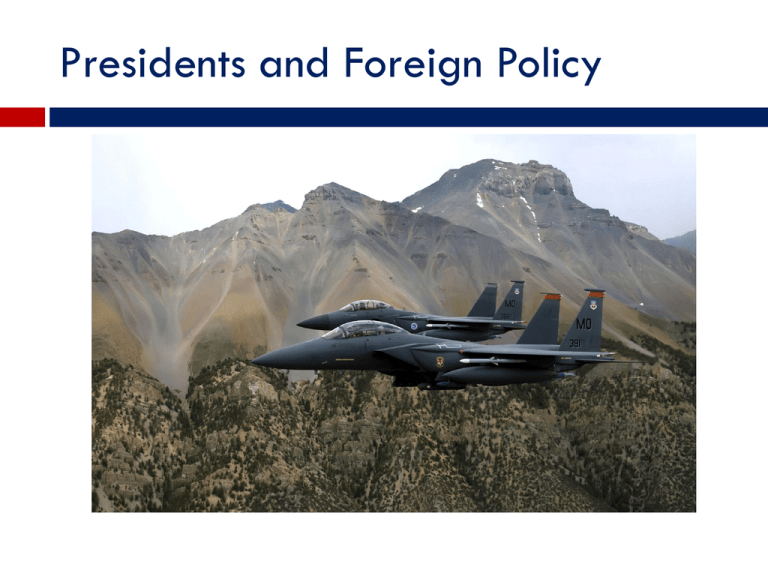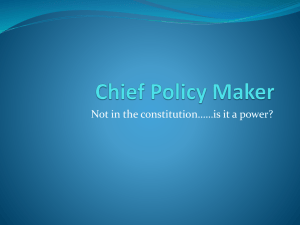Domestic Presidency
advertisement

Presidents and Foreign Policy The President’s constitutional powers in the foreign affairs 1. Chief diplomat 2. Commander in chief Congress and War The Constitution’s Article I grants Congress the power to • declare War • raise and support Armies • provide and maintain a Navy; • make Rules for the . . . land and naval forces • provide for calling forth the Militia to … suppress Insurrections and repel Invasions • provide for organizing, arming, and disciplining the Militia "The only case in which the Executive can enter on a war, undeclared by Congress, is when a state of war has been [initiated by] another [country].“ – James Madison Today’s session 1. The information and leadership advantage that the president has over Congress in the making of foreign policy 2. Presidents’ ability to act on their own in the area of foreign affairs 3. Presidents’ power over war Presidential Advantages in Foreign Policy 1. control of information Presidential Advantages in Foreign Policy 1. control of information 2. unitary authority in diplomatic relations “the exercise of power by a single "The only case in which the hand.” can enter on a Executive war,Alexander undeclared by Hamilton Congress, is when a state of war has been [initiated by] another [country].“ – James Madison "We're in the process, all of us, of reading the Trans-Pacific partnership agreement.” Mitch McConnell executive agreement A treaty-like agreement made by president that doesn’t require Senate ratification. Executive Agreements and Treaties (1939-2013) number enacted executive agreements treaties 17,300 1,100 Source: State Department, 2014. Military Actions (1946-2015) percentage of military actions 85% authorized solely by president authorized by Congress, UN, or NATO 15% Source: Rough estimates derived from Barbara Salazar Torreon, “Instances of Use of United States Armed Forces Abroad, 1798-2015,” Congressional Research Service, January 15, 2015. Excludes CIA operations and non-combat troop deployments. “We weren’t asked for advice . . . we were informed what was taking place.” Thomas P. “Tip” O’Neill , Speaker of the House Was the War a Mistake? 60 percentage of respondents 50 50 47 40 39 30 20 24 22 26 Start Year 1 49 49 53 51 39 Vietnam War Iraq War 28 10 0 Year 2 Year 3 Year 4 Year 5 Source: For Vietnam, Gallup polls; for Iraq, Pew Research Center polls “axis of evil” Preemptive War Doctrine Doctrine holding that U.S. can attack a potentially threatening nation even before the threat materializes. "The evidence indicates that Iraq is reconstituting its nuclear weapons program. . . . Satellite photographs reveal that Iraq is rebuilding facilities at sites that have been part of its nuclear program in the past." Iraq War Resolution (2002) Vote in House Vote in Senate 77 297 133 23 Yes No Yes No Pre-Invasion News Coverage number of quoted statements in the news Bush administration sources Congressional opponents 1718 150 Source: Estimated from Danny Hayes and Matt Guardino, “Whose Views Made News?” Political Communication 27 (2010), 73. Based on ABC, CBS, and NBC coverage, Aug 1, 2002-Mar 19, 2003. Opinion of Iraq Invasion 72% 25% disapprove Source: Gallup poll, March 24, 2003 approve Why Has Control of War Shifted to the President? 1) Congress’s reluctance to exercise its constitutional control over war? OR: 2) Changes in the world that have tipped the balance in war decisions away from Congress and toward the president? “It has been circumstance which has given the executive its great predominance . . . . An entire era of crisis in which urgent decisions have been required again and again, decisions of a kind that Congress is ill-equipped to make…The President has the means at his disposal for prompt action; the Congress does not.” - William Fulbright War Powers Act (1973) 1. Requires the president to inform Congress within 48 hours of the start of military action of the reasons for it. 2. Requires the president to stop offensive operations within 60 days unless Congress authorizes an extension. 3. Requires the president to withdraw U.S. troops within 30 days if Congress has not authorized an extension. “While I appreciate receiving that support, my request for it did not . . . constitute any change in the longstanding positions of the executive branch on . . . the constitutionality of the War Powers Resolution.” Summary 1. presidents’ constitutional authority in foreign affairs >chief diplomat >commander-in-chief 2. presidents’ foreign policy advantage over Congress >access to policy-relevant information >unitary authority in diplomatic relations 3. presidents’ opportunities to act on their own authority in foreign affairs






